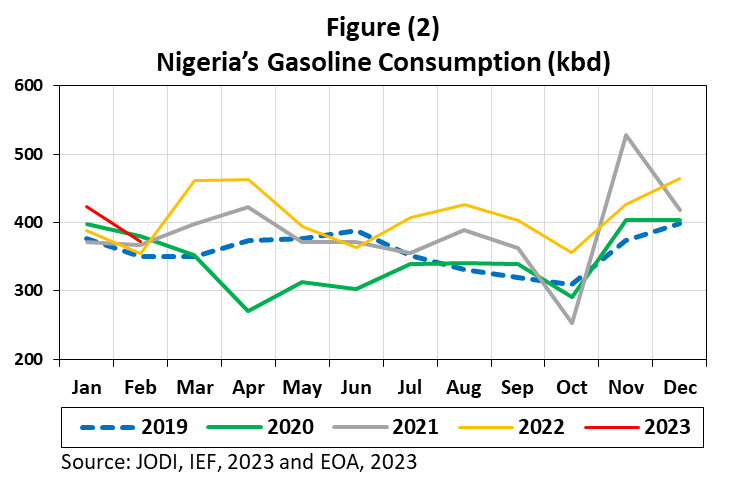Daily Energy Report
India’s gasoline consumption, Nigeria’s Dangote refinery, biofuels in Sweden, oil and gas discoveries in Zimbabwe, impact of Alberta’s fires on energy companies, and more
CHART OF THE DAY: India’s Gasoline Consumption Hit Record-High in March
Commentary
India’s oil consumption hit a record high in March before declining in April to match historical trends. Figure (1) above shows that consumption in the first four months of this year was higher than the same period in previous years, including 2019 (before the COVID-19 pandemic).
EOA’s Main Takeaway
India’s gasoline consumption remains low relative to its economy and population and is expected to continue growing, despite higher taxes and the adoption of electric vehicles. Increased incomes and urbanization lead to a continuous increase in gasoline consumption.
India is one of the few countries in the world that has a large surplus refining capacity and exports petroleum products. However, the highest risk to oil consumption growth in India is government policy. For instance,
the government’s efforts to make supplies available to its people at reasonable prices, while imposing heavy taxes, increase the risks for future growth in gasoline consumption.
STORY OF THE DAY
REUTERS: Nigerian president to commission Dangote refinery in two weeks
Summary:
On May 22, Nigeria is expected to commission its multi-billion-dollar Dangote refinery (650,000 b/d), according to a report by Reuters.
The refinery's construction began in 2016 by billionaire industrialist Aliko Dangote's Dangote Group to end Africa's biggest oil producer's dependence on oil product imports.
EOA’s Main Takeaway:
It has been our view since 2014 that the world is moving toward more competition in petroleum products and less competition in crude. The recent wave of refining projects around the world, including the Dangote, proves this point.
Historically, Nigeria has spent billions of dollars on imports of petroleum products due to the lack of refining capacity. The Dangote refinery is a welcome addition, and its success would encourage the private and public sectors to build more refineries.
Figure (2) below shows Nigeria’s gasoline consumption, which is expected to continuously grow in the coming years. However, it remains to be seen if it will decline, along with the consumption of other petroleum products as the government reduces subsidies.
NEWS OF THE DAY
1- REUTERS: Sweden to cut biofuel additives in gasoline and diesel
Summary:
According to a report by Reuters, a minority coalition in Sweden enjoying the support of right-wing anti-immigration Sweden Democrats has reached an agreement to reduce the amount of biofuel mixed with diesel and gasoline, an action they believe will reduce prices for drivers who find it difficult to afford such oil products.
Reuters noted that the coalition has "already cut taxes on fuel, increased tax breaks for people who drive to work, and ended subsidies for new electric vehicles."
The price of diesel is at around 20.3 Swedish crowns ($2.00) per liter while petrol currently costs 18.8 crowns, based on the report. According to the government, cutting the amount of biofuel will bring the cost of a liter of diesel down by 5.5 Swedish crowns, Reuters wrote.
Despite slashing prices for drivers, particularly those who live in the countryside, the move was criticized by the Swedish Environmental Protection Agency which said last month that cutting biofuel additives would affect efforts to reach net zero emissions by 2045, Reuters reported.
EOA’s Main Takeaway:





